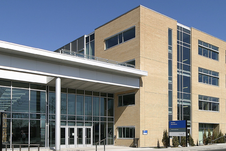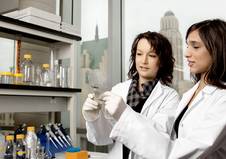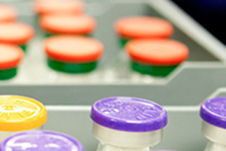The Faculty of Pharmacy

The Faculty of pharmacy at Université de Montréal is one of the largest faculties of pharmacy in Canada. In 2012, nearly 1000 students were enrolled in undergraduate studies and more than 250 students were pursuing graduate studies.
Located in the Jean Coutu pavilion on Mount Royal, the Faculty has access to modern facilities and beautiful surroundings. For more information on Université the Montréal, go to UdeM in English.
The Faculty offers three undergraduate programs: an entry-level Pharm. D., a Baccalaureate in biopharmaceutical sciences and a program for pharmacist trained in a foreign country. The entry-level Pharm. D. program was the first to be implemented in Canada. For more information (in French) on this program, go to Pharm. D.
The Baccalaureate in biopharmaceutical sciences focusses on the drug development process and prepares students to contribute to this field. For more information (in French) on this program, see Baccalauréat en sciences biopharmaceutiques.
The program for pharmacist trained in a foreign country is offered only to those who are recommended by the Quebec Order of pharmacist (Ordre des pharmaciens du Québec). For more information (in French) on this program, see Qualification en pharmacie.
The Faculty also offers various graduate programs such as a clinical Master in advanced pharmacotherapy, a specialized degree in drug development and research-based graduate programs (see Cycles supérieurs).
Research-based Graduate Programs

While our undergraduate programs and professional masters are designed for a French-speaking audience, research-based programs, especially the Ph. D., are more accessible to non-francophone applicants although a minimal knowledge of French is required. A student can be allowed to write and present his/her thesis in another language than French.
The Faculty offers a 45 credits research-based master (M. Sc.) with 6 options : pharmaceutical analysis, medicinal chemistry, medications and population health, pharmacogenomics, pharmacology and pharmaceutical technology. Most of the credits are attributed for the completion of a research project.
For a more complete description (in French ), see Maîtrise et Doctorat en sciences pharmaceutiques.
A 90-credits research-based Ph. D. program is also offered. One the five following options must be selected: pharmaceutical analysis, medicinal chemistry, medications and population health, pharmacology and pharmaceutical technology. Again most credits are attributed for an innovative research project. For a more complete description (in French ), see Maîtrise et Doctorat en sciences pharmaceutiques.
For general information on admission, go to Students admission.
http://fesp.umontreal.ca/Fichiers/translation.pdf Note that, at the Faculty of pharmacy, a research director should have accepted to supervise the student’s work before admission. A list of potential research directors can be found in the description of the Faculty research activities (see below).
Note that the Faculty also accept post-graduate fellows. Please contact the professor with whom you wish to pursue such fellowship for more information.
Research Activities
The Faculty of pharmacy at Université de Montréal is very active in research and is among the top Faculties of Canada with respect to research funding.
Research activities cover all aspects of drug development and drug use, offering tremendous training opportunities for the would-be researchers in this dynamic field.
The research activities at the Faculty can be summarized under four broad axes: medication and population health, discovery and validation of therapeutic targets, pharmacometrics and pharmacotherapy, and drug formulation and analysis.
Medication and Population Health

Research projects in this sector look at medication use with approaches taken from pharmacoepidemiology, pharmacoeconomics, social sciences and public health. To know more about the specific expertise of our professors working in that field, you may consult their page.
Professors:
Bérard, Anick
Blais, Lucie
Collin, Johanne (axis director)
Lachaine, Jean
Lalonde, Lyne
Laurier, Claudine
Mailhot, Claude
Moride, Yola
Perreault, Sylvie
Schnitzer, Mireille
Tannenbaum, Cara
Clinical professors or professional practice professors:
Beauchesne, Marie-France
Bussières, Jean-François
Ferreira, Ema
Frenette, Anne Julie
Lamarre, Diane
Mallet, Louise
Savoie, Michèle
Tremblay, Lydjie
Vanier, Marie-Claude
Williamson, David
Discovery and validation of therapeutic targets

Research projects in this sector aim at understanding the effects of medications at the molecular, cellular, animal or human level. It also includes studies in pharmacokinetics, pharmacogenomics and pharmacometrics. To know more about the specific expertise of our professors working in that field, you may consult their page.
Professors:
Burelle, Yan
Fiset, Céline
Lamontagne, Daniel
Lévesque, Daniel
Marleau, Sylvie
Ong, Huy
Pharand, Chantal
Servant, Marc (axis director)
Stagg, John
Turgeon, Jacques
White-Guay, Brian
Pharmacometrics and Pharmacotherapy

Text will follow.
Professors:
deBlois, Denis
de Denus, Simon
Labbé, Line
Li, Jun
Lordkipanidzé, Marie
Michaud, Véronique
Nekka, Fahima (axis director)
Varin, France
Clinical professors:
Letarte, Nathalie
Perreault, Marc
Sheehan, Nancy
Thirion, Daniel
Vadnais, Barbara
Drug Formulation and Analysis

This sector includes 3 activities related to drug technology, physico-chemistry and pharmaceutical chemistry. Research in pharmaceutical technology looks at innovative drug targeting and drug delivery methods. To know more about the specific expertise of our professors working in that field, you may consult their page by clicking their names in the following list:
Professors:
Banquy, Xavier
Giasson, Suzanne
Hildgen, Patrice
Leblond Chain, Jeanne (axis director)
Leclair, Grégoire
Roullin, Valérie Gaëlle
Winnik, Françoise
Professional practice professor:
